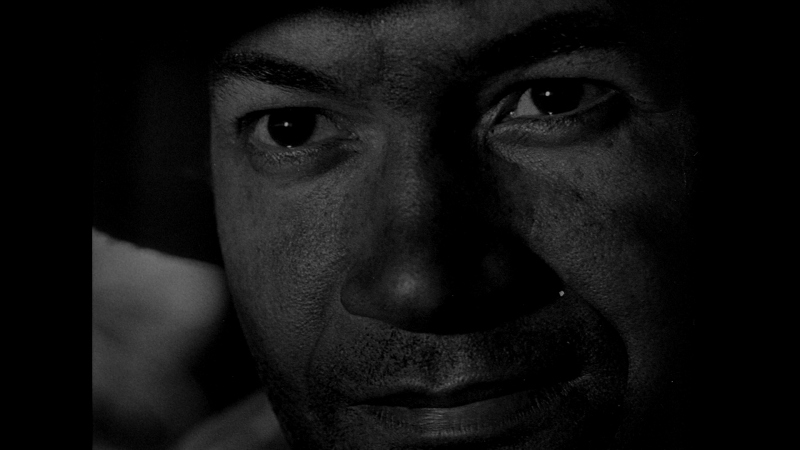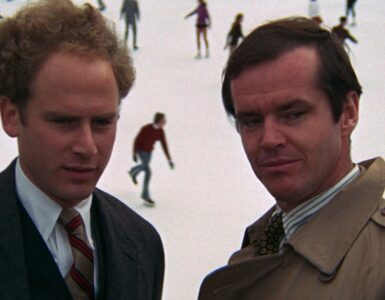
My first encounter with Stanley Kubrick’s debut film was one the shelves of Movie Madness in Portland, OR. An amazing video store that seems to stock anything and everything that’s available, it naturally had a copy, through some means or another, even though, I later found out, Kubrick had spent most of his later career trying to bury it. It never showed up on any best-of lists, it never played either of the retrospectives of the filmmaker I had to that point attended; it seemed to me little more than weird curiosity that might be better avoided, given the filmmaker’s wishes.
Viewing it now, in a very handsome new Blu-ray edition from Masters of Cinema, it’s easy to see what Kubrick found uncomfortable about it. Having shot the film without sound, and dubbing all the dialogue and effects in postproduction, the result is often quite amateurish, and very clear that Kubrick didn’t possess enough footage to account for his dialogue, leaving many of the voices to be heard offscreen. It also condenses many of the viewpoints he would better express later in his career, about war, the human condition, lust, and anything else one can get one’s hands on within 72 minutes, into some very on-the-nose pieces of dialogue and voiceover. But to write it off completely, certainly as an important component of Kubrick’s career, and also as a thing unto itself, would to do everyone involved a great disservice – one can see in it not just how far Kubrick would advance from this point, but how much of him was already so clearly realized so early in his life. And if nothing else, it’s far from the worst film he made.

Following a small band of four soldiers in their efforts to escape from behind enemy lines during a war that hasn’t been fought, “nor one that will be, but any war,” as the opening narration informs, the film explores both the impossibility of emerging from war a whole person, and the arbitrary nature of individual conflicts. The soldiers comment on how the other side isn’t too dissimilar from themselves (underscored by Kubrick’s cast playing dual roles on both sides of the conflict), even as they reflexively demonize them, seeking to harm them with a fervor that extends well beyond their duty as soldiers (though is encouraged in military environments). They’re themes well worth exploring, and Kubrick does them fine service in his short film, still bringing a level of intelligence to the cinematography that would come to be associated with his work in the decades to come. On Killer’s Kiss, he remarked that it was proof that just because a photographer becomes a director, that doesn’t mean the photographer is no longer there, and the same could be said of Fear and Desire as well.
Killer’s Kiss and Fear and Desire are the only features on which Kubrick took a credit for cinematography, though he always kept up with the latest developments in the field, and editing. Nonetheless, these should be viewed almost especially as auteurist films, so purely do they emerge in a very physical sense from his hand. In the early 1950s, it was extremely unusual for a director to have a hand in, let alone be the one solely responsible for, the editing of his or her films, but Kubrick’s independent status afforded (and, in other ways, demanded) such luxuries. In this way, he’s able to explore some editing techniques that are pretty audacious for the time; even if they were to work around a paucity of footage, the cuts feel so well-tuned and psychologically taught that it’d be hard to notice if not for the soundtrack. One sequence in particular, in which enemy soldiers are killed amidst spilling food, made to represent a level of gore then unacceptable on American screens, should probably be shown in film classes alongside the standbys of expressionist editing.

As previously mentioned, the new Blu-ray edition of Fear and Desire, courtesy of Masters of Cinema, is well beyond what I ever would have expected from this title, which more or less seemed damned to bootleg purgatory forever and always. Working from what must be a really striking print, they’ve given us a truly great black-and-white transfer in the film’s original aspect ratio, 1.37:1. Contrast is a big feature here, one that MoC kind of revels in, and in this case rightfully so. Kubrick’s sharp-focus camerawork in those early days really made his work stand out amidst directors more keen to focus softly on their stars (and especially starlets), but Kubrick seemed to be turning the screws on his characters even through his camera adjustment, and MoC have rightfully given this a very crisp look, with plenty of depth and grain to bolster it.
Kubrick did gain one key advantage in working with postproduction sound, which is a very clean sound track, and that has also been carefully transported to this Blu-ray edition.
If Kubrick tried to bury Fear and Desire due to its amateurish qualities, it wouldn’t be too hard to venture a guess as to his feelings surrounding his documentary work, of which only three films survive (though it’s possible he made more, it is not known definitively), and are generously available on this disc as well. Day of the Fight follows a day in the life of a boxer, and is mostly an overview of the discipline and lifestyle required for the profession, though Kubrick hits on more than a few great images, and one particular sequence in which the narrator describes the harm the boxer can inflict while Kubrick shows him lovingly playing with his dog sort of shows the way towards a lot of what was to come for the director. It’s the best of the bunch, though Flying Padre, about a priest who covers the 400-plus miles for which he is responsible by flying a small airplane, certainly covers an interesting subject, and The Seafarers, about the union that sprung up for sailors in the late 1930s, is valuable history (and Kubrick’s first color film; he made it to fund the postproduction work on Fear and Desire). None of them look exceptionally good, and I doubt any work was done to clean them up, but they’re valuable for their content alone.
Additionally on the disc, we get a short interview with film critic Bill Krohn, who does a very good job not only defending Fear and Desire, but illustrating just how well it fits into his filmography as a whole. The booklet also contains a short statement on the film by Kubrick, presumably before he disowned the film, as he discusses the many things he learned from its making, as well as an essay by film scholar James Naremore, who discusses the film’s history and thematic merit, looping in discussion of Kubrick’s short films along the way.
Because of the breadth of content available on the disc, it’s more than worth owning – for any Kubrick fan (so, most cinephiles), it’s a necessity, the last link to making available all of the filmmaker’s works on Blu-ray, which is pretty astounding, all things considered. Highly, highly recommended.
Buy Fear And Desire from Amazon.co.uk.




![Bergman Island (The Criterion Collection) [Blu-ray]](https://criterioncast.com/wp-content/uploads/2022/11/bergman-island-the-criterion-collection-blu-ray-400x496.jpg)
![This Is Not a Burial, It’s a Resurrection (The Criterion Collection) [Blu-ray]](https://criterioncast.com/wp-content/uploads/2022/11/this-is-not-a-burial-its-a-resurrection-the-criterion-collection-blu-ray-400x496.jpg)
![Lars von Trier's Europe Trilogy (The Criterion Collection) [The Element of Crime/Epidemic/Europa] [Blu-ray]](https://criterioncast.com/wp-content/uploads/2022/11/lars-von-triers-europe-trilogy-the-criterion-collection-the-element-of-400x496.jpg)
![Imitation of Life (The Criterion Collection) [Blu-ray]](https://criterioncast.com/wp-content/uploads/2022/11/imitation-of-life-the-criterion-collection-blu-ray-400x496.jpg)
![The Adventures of Baron Munchausen (The Criterion Collection) [4K UHD]](https://criterioncast.com/wp-content/uploads/2022/11/the-adventures-of-baron-munchausen-the-criterion-collection-4k-uhd-400x496.jpg)
![Cooley High [Criterion Collection] [Blu-ray] [1975]](https://criterioncast.com/wp-content/uploads/2022/11/cooley-high-criterion-collection-blu-ray-1975-400x496.jpg)